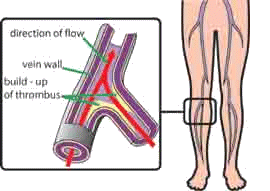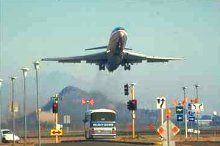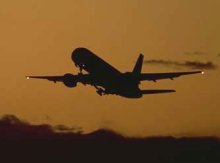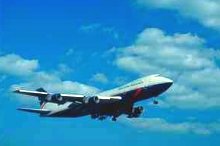|
Economy
Class Syndrome (Deep Vein Thrombosis - DVT)
Much
about this condition has been reported recently in the media.
Deep Vein Thrombosis (DVT) is a condition in which a clot,
or thrombus, typically forms in a deep vein in a leg. People
with a DVT may notice pain and swelling in the leg where the
clot has formed, though smaller clots may not cause any symptoms.
The major problem occurs when a part of the clot breaks off
and flows to the lungs. This condition, called a Pulmonary
Embolus, can cause severe injury or death.
 Sitting
still for long periods of time in cramped conditions can lead
to swollen ankles and occasionally DVT. This of course is
not unique to air travel but the cramped conditions often
found in economy class seats especially on long haul flights
has given rise to the name "Economy Class Syndrome". Sitting
still for long periods of time in cramped conditions can lead
to swollen ankles and occasionally DVT. This of course is
not unique to air travel but the cramped conditions often
found in economy class seats especially on long haul flights
has given rise to the name "Economy Class Syndrome".
Recent research, however, has found that passengers in any
seating class of the aircraft may develop a DVT. Research
indicates that any situation where one's activity is limited
for long periods - a long automobile drive or train ride,
for instance - may contribute to a DVT. For this reason, the
term Traveler's Thrombosis is more appropriate.
 Dehydration
can often put travellers at higher risk. The circulating air
in aircraft cabins is kept dry and this can lead to passengers
becoming significantly dehydrated. Consumption of alcohol
before or during the flight will worsen this. Some passengers
may be flying from areas that have a hot and arid climate
and may be dehydrated on boarding the plane. Others may be
dehydrated as a result of contracting a bout of travellers
diarrhoea. Dehydration
can often put travellers at higher risk. The circulating air
in aircraft cabins is kept dry and this can lead to passengers
becoming significantly dehydrated. Consumption of alcohol
before or during the flight will worsen this. Some passengers
may be flying from areas that have a hot and arid climate
and may be dehydrated on boarding the plane. Others may be
dehydrated as a result of contracting a bout of travellers
diarrhoea.
Other
risk factors include; age (over 60), previous DVT, varicose
veins, recent surgery or injury, pregnancy, oral contraception,
hormone replacement medication, cardio-respiratory disease
and other chronic illnesses including malignancy.
Those
persons with three or more of the above risk factors should
discuss additional protective measures with their doctors.
 |
Preventative
measures against DVT include:-
-
Regular
stretching and mobility exercises and if possible
walking around the cabin during the flight.
-
Drinking
sufficient fluids to keep the urine pale.
-
Taking
a low dose aspirin tablet (75mg) for its anti-adhesive
effects on blood platelets.
-
The
use of graded compression stockings. These are available
at most pharmacies and are marketed specifically
for use during long haul flights.
-
Loose-fitting
clothing may be beneficial in avoiding constriction
of veins.
-
Some
recommend taking short naps, instead of long ones,
to avoid prolonged inactivity
|
This condition
has been known to doctors for many years. Until recently it
was beleived it only affected people of advanced years. It
is now known it can strike at any age irrespective of physical
fitness. Complications may arise that prove fatal. Anyone
who sits in cramped conditions on a long-distance aircraft,
coach, train or car is particularly at risk.
 Jet
Lag Jet
Lag
Nowadays
it is possible to travel to distant parts of the globe in
a matter of hours. This can result in the traveller ending
up in a part of the world where time is out of sync. With
his or her own "body clock" or Circadian Rhythms which regulate
our sleep patterns.
If we travel east or west by more than four time zones (hours)
then we will usually be affected. This means that travellers
from the UK will be affected when travelling to Asia, Australia,
New Zealand, The Pacific Islands, North and South America
but will not normally be affected when travelling to Europe,
Africa and The Middle East.
In
the past when people travelled by sea there was ample time
for the body to adjust to the local time but with the advent
of modern high speed aircraft the body does not have time
to adjust. Hence the term "Jet Lag". It normally takes one
day per time zone (hour) for the body to adjust to its new
surroundings.
 The
effects of jet lag are usually tiredness & insomnia but
can also include: poor concentration, nausea, vomiting, constipation
and general malaise. The effects are made worse by alcohol
and hangover. The
effects of jet lag are usually tiredness & insomnia but
can also include: poor concentration, nausea, vomiting, constipation
and general malaise. The effects are made worse by alcohol
and hangover.
Westward
travel is usually tolerated better than Eastward. Stop-overs
on long haul flights may be helpful. Avoiding heavy commitments
on the first day after arrival is recommended. When travelling
away on vacation the effects may not be so noticeable but
on returning home to a normal routine they will be.
Sleeping
whilst flying may help to reduce the symptoms of jet lag but
long periods of immobility aboard the aircraft can make the
traveller more susceptible to DVT.
Some
travellers find taking melatonin helpful. It may help the
body to adjust its circadian rhythms but its effects are scientifically
unproven. It is not readily available in the UK but can also
be obtained in some countries such as USA and Hong Kong.
-
A
relaxed flight is important.
-
Avoid
travelling when you are already tired and take rest
before departure.
-
Remember
the actual travelling time will usually be at least
twice the actual time spent in the air since it
will include travelling to and from and hanging
around in airports.
-
Avoid
heavy commitments on the first day. Be prepared
for tiredness in the evenings and early waking which
can last up to 5 or more days.
-
Sleeping
tablets will help you to sleep and be correspondingly
alert during the next day but they do not speed
up adjustment to the new time zone.
|
|
Respiratory
Infections
 There
is no evidence that re-circulation of the air in aircraft
cabins increases the risk of spreading infections amongst
the passengers since very effective filters are used to remove
bacteria and viruses. There
is no evidence that re-circulation of the air in aircraft
cabins increases the risk of spreading infections amongst
the passengers since very effective filters are used to remove
bacteria and viruses.
However, sitting for long periods in close proximity to passengers
who are suffering from common colds or influenza may increase
the chances of another passenger becoming infected. This is
why most airlines discourage passengers with infectious conditions
from flying.
Tuberculosis is increasing world-wide and there is a small
but real risk of catching the disease during air flights.
Transmission has only been recorded in flights lasting over
eight hours. The risk is greater when many of the passengers
on board are from countries with a high incidence of the disease.
The risk of transmission of TB on a commercial aircraft is
low and there is no reason to suspect that the risk of transmission
on aircraft is greater than in any other confined space including
other forms of public transportation if the duration is the
same.
Parasite
Infestation
Occasionally
head lice and other skin parasites may be passed on through
contact with aircraft seats where previous passengers have
been infested. It must be stated though, that most airlines
carry out thorough cleaning of the cabin and other facilities
between flights.
International flights to some countries (including the UK)
require the spraying of the aircraft passenger compartment
with insecticide when departing from certain locations while
the passengers are present, or require periodic applications
of a residual insecticide. This practice, called disinsection,
is used to prevent the importation of insects such as mosquitoes
but this will also have an effect on any other insect parasites
present.
Altitude
sickness on arrival
 Most
healthy people who travel rapidly to 3500m above sea level
may develop symptoms of acute mountain sickness (AMS) after
arrival. People with respiratory or cardiac problems may experience
symptoms at even lower levels. Most
healthy people who travel rapidly to 3500m above sea level
may develop symptoms of acute mountain sickness (AMS) after
arrival. People with respiratory or cardiac problems may experience
symptoms at even lower levels.
A few airports in the Andes and Himalayas are actually sited
above this altitude which can result in symptoms occurring
soon after disembarking.
An awareness of the symptoms of AMS would be helpful. Dehydration
exacerbated by the dry aircraft cabin atmosphere may worsen
symptoms.
Acclimatisation and rest after arrival is recommended since
strenuous activity may worsen symptoms.. Further ascent should
be avoided until any symptoms have disappeared.
Those persons with pre-existing hypoxic respiratory disease
should seek medical advice prior to departure.
Fear
of flying
An
estimated nine million people in the UK suffer anxiety about
flying and may miss out on professional and personal opportunities
as a result. Fear may develop from a bad experience - a rough
flight, or after a news report of a high jacking or crash.
Panic attacks are common and the sensation is often so frightening
that the sufferer may refuse to fly from then on.
 |
Advice
for travellers who are afraid of flying
-
Emphasise
that flying is safer than road or rail travel in
most developed countries.
-
Try
distraction by talking with other passengers, watching
in-flight films, eating or reading.
-
Tell
the cabin crew. Reassurance about strange sounds
etc. can help.
-
Visit
your doctor prior to travel to assess your general
fitness for air travel.
- Consider
taking a tranquilliser before flying but remember,
these drugs do not mix well with alcohol.
|
Air rage
 This
term describes the psychological or physical violence occurring
within an aircraft during flight. It is of particular concern
because of the cramped conditions inside an aircraft and the
inevitable involvement of cabin crew and other passengers. This
term describes the psychological or physical violence occurring
within an aircraft during flight. It is of particular concern
because of the cramped conditions inside an aircraft and the
inevitable involvement of cabin crew and other passengers.
There have been several instances where aircraft have had
to land prematurely to offload disruptive passengers and taken
legal action against those involved.
Air
rage may be caused by a combination of events, including delayed
flights, exhaustion due to lack of sleep, excessive use of
alcohol and the behaviour of fellow passengers. It has recently
been recognised that a common cause of air rage is nicotine
withdrawal in heavy smokers on long-distance 'no smoking'
flights which have now been introduced by many airlines.
Passengers
should avoid excessive alcohol consumption and discourage
their travelling companions from heavy drinking. Airlines
have the right to refuse to carry those who are intoxicated
or who have previously caused disruption on a flight.
|